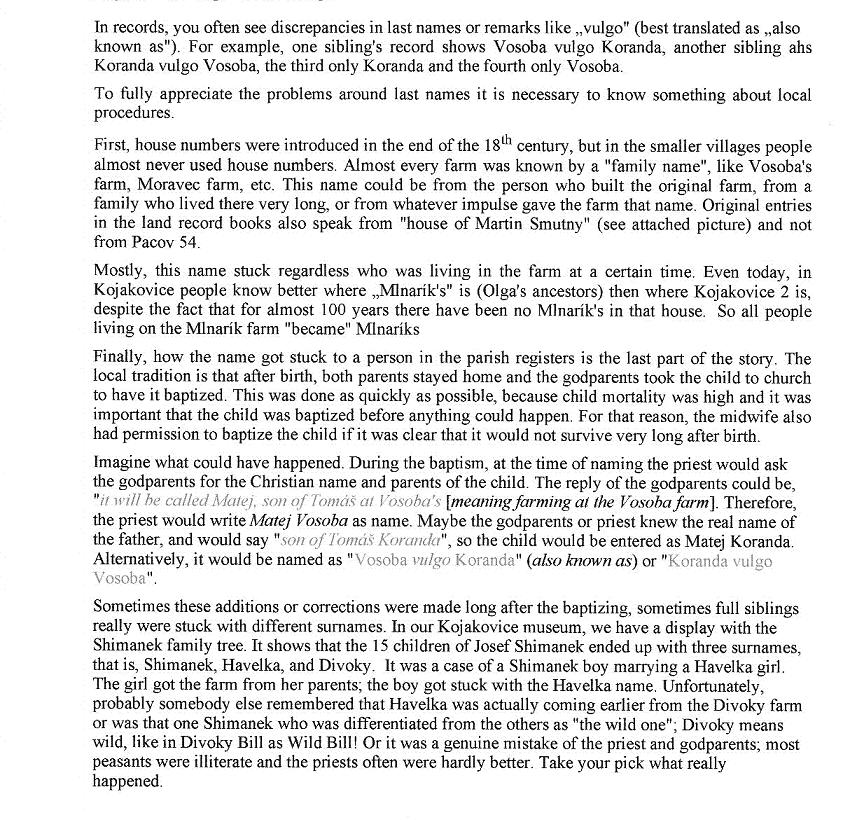Vulgo Surnames
A common problem for researchers of Czech lineage is finding double surnames in records or in results received from a Czech researcher. Men, women, and children can be found to have had two surnames in church and civil records, particularly in South Bohemia although vulgo surnames also occurred in western and central Bohemia and in some regions of Moravia (Czech Republic). The naming practice continued into the 20th century.
The use of an alias surname was sometimes due to a nickname but most of the time was due to a house name or “jmeno po chalupa” (name after cottage). As the peasants in rural Bohemia began to own property in the early 17th century, that property which might have been a house or farmstead took on the surname of the owner. When another family moved into that house, they took on the house name as an alias. After Matej Sazma moved his family into a Divoky farmstead, he and his wife and children were then known as Sazma vulgo Divoky or Divoky vulgo Sazma and sometimes just Divoky or just Sazma. If a man married a woman who was inheriting her family home, he took her surname as an alias, retaining his original surname as his legal name. Jan Koranda who married Anna Pokorny and took over her family’s property, was then known as Jan Koranda vulgo Pokorny and Jan Pokorny vulgo Koranda and Jan Koranda and Jan Pokorny. Serfs weren’t worried about legalities but their government mandated in the 20th century that they use only one surname so some house names were dropped then. They chose one surname to emigrate, usually the blood name worn to America.
Should you find a double surname for an ancestor, you will want to determine which was the inherited “blood name”. Usually tracing back in time reveals the answer. If you find that Frantisek Pekar married Barbora Simanek in 1698 and was called Frantisek Simanek in some or all records thereafter, and their descendants were Simanek vulgo Pekar or Pekar vulgo Simanek, the combo started with the 1698 marriage. Find Frantisek’s birth to verify that his father was simply Pekar, showing that Frantisek was the Pekar who picked up the vulgo name.
Seigniorial Registers (nobles’ census of their serfs) might help. The book for 1820 might have Matej Sazma at the Divoky farmstead. If he is there, holding it with emphiteut rights, he’ll be called Divoky. You could find that Matej in an earlier register to verify that he is simply Sazma before taking over the Divoky grunt (property).
Other terms for vulgo/alias were used:
- aka = known as, Latin
- aliter and aliter dicti = other, Latin
- aut = or, Latin
- bekannt = known, German
- ci, haceked c = whose?, Czech
- dicti = otherwise saying, Latin
- gennant = called, German
- jinak = otherwise, Czech
- nebo = or, otherwise, Czech
- neb for nebo, Czech
- nomeninis = alias, Latin
- notus = known, familiar, Latin
- oder = or, German
- proprie = correctly, Latin
- recte = right, correctly, Latin
- seu = or, Latin
- sonst = alias, German
- spravne= correctly, Czech
- take = too, else, such as, just as, Czech
- v. for vulgo, Czech
- vel = also, actually, perhaps, either, Latin
- vid = view, Czech
- vubec = in general, actually, altogether, Czech
- vulgo = alias, in the vulgar (common) tongue, Czech
CGSI’s Nase rodina, March 2010 and March 2018 issues have good articles on surnames.
This document was written by Czech professional researcher Olga Cerna:

With thanks to Judy Nelson for this article.